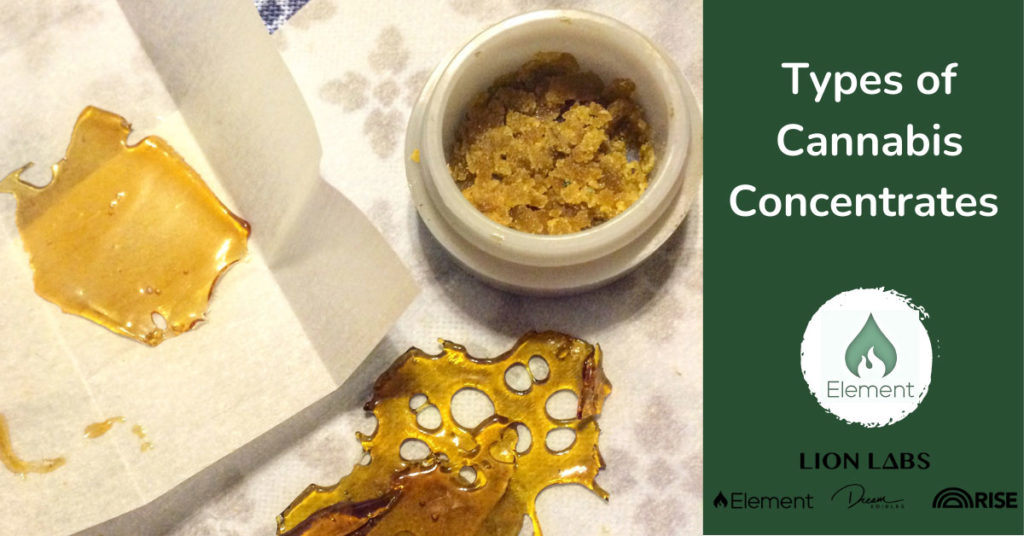Cannabis extracts- also known as cannabis concentrates- are oils made by extracting active compounds: cannabinoids and terpenes. These oils can be consumed in a variety of ways, like smoking, vaping, in edibles, or as creams and lotions.
Types of Cannabis Concentrates
Live resin, cured resin, distillate, hash rosin, bubble hash, and more are all examples of concentrates on the market today. These are created by exposing the plant to different types of chemical solvents (like butane or ethanol), water, ice, or a combination of water and ice.
It’s important to understand the differences between these types so that you can make a more educated decision when shopping for the best concentrate for you.
Live Resin: Made by using hydrocarbon gases (butane, propane, pentane) to extract cannabinoids and terpenes from “fresh frozen” flowers. “Fresh frozen” preserves the cannabinoids and terpenes in their form as they are when the plant is growing and alive. This process best preserves strain-specific flavors and aromas. These “raw” compounds can also provide a very unique experience when compared to the high from cured extracts.
Because the flowers are frozen, it is necessary to expose the flowers to hydrocarbon gases at a very low temperature (sometimes down to -80C) to make sure the extraction process is efficient. You can find examples of quality live resin products here.
Cured Resin: Like live resin, cured resin is also created by using hydrocarbon gases (butane, propane, pentane) to extract cannabinoids and terpenes from the plant. The difference is that only dried/cured flower is used. This means that the cannabis flowers are harvested, dried, and cured prior to the extraction process. The end product is typically high in THC, has strain-specific flavors, but it is expressed differently since the flowers were cured.
Isolate: This concentrate type can be created through solvent-based extraction methods (just like live resin, cured resin, or distillate). Isolates, however, have very high concentrations of a single type of cannabinoid (>95%). The physical consistency is also different; it looks is a fine crystalline powder- perfect for use in edibles or consumed by dabbing. Some common isolates include THC-A, CBD, CBG, CBN, and CBC.
Distillate: This odorless and lightly colored oil is made by exposing trim and/or flower to either hydrocarbons or ethanol. Once washed in the desired solvent, the solvents are then removed through evaporation, and the oil is distilled to make a highly concentrated THC oil. This oil is usually >85% THC and is used in vape cartridges, edibles, and other cannabis products. Its consistency is usually very thick at room temperature.
Hash Rosin: It’s commonly referred to as a “solvent-less” concentrate because it’s made using water and/or ice to extract the cannabinoids and terpenes. Hash rosin can come in quite a few different physical forms depending on the post-processing techniques used. Once the extraction is completed, the concentrate created is then pressed between two heated plates and filtered to create the final product.
Bubble Hash: Similar to hash rosin, this concentrate type is also created by using ice/water for extraction. The resin glands of the plant are broken off physically and filtered through a series of screens (also known as bubble bags) to separate the trichomes (THC-containing glands). The final product isn’t pressed like hash rosin, though. It also tends to be drier and crumble-like.
Why Use Hydrocarbons to Extract Cannabinoids and Terpenes?
Liquid hydrocarbon gasses are commonly used because they are chemically similar to cannabinoids and terpenes. There is a polar attraction between them and the compounds can easily be collected with gases like butane, propane, pentane, and many others (including ethanol).
It’s important to know that prior to consumption, concentrates created using hydrocarbons are placed in vacuum ovens to remove the excess gases in a process called “purging”. Through heat and pressure, the products are purified of any residual gas. They are also required to pass rigorous compliance testing where residual solvent content is analyzed to make sure that it’s safe for consumption.
Here at Element Extractions, we pride ourselves on our quality live resin products. Experience well-preserved terpenes and the very best of raw cannabinoids here.

